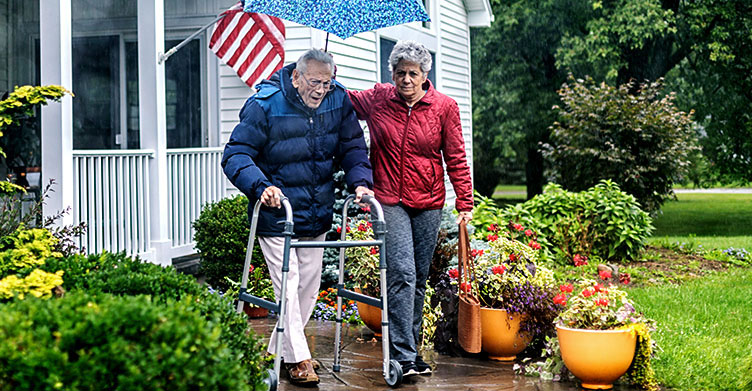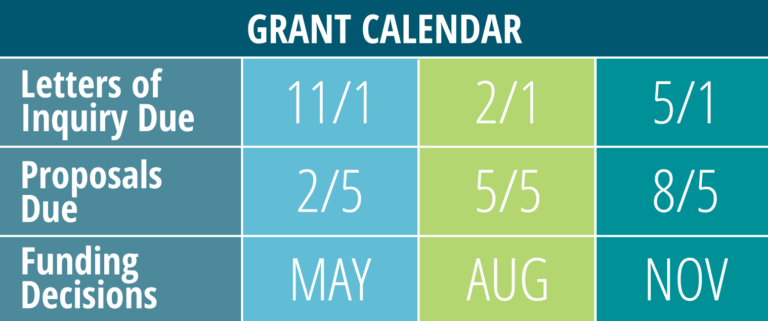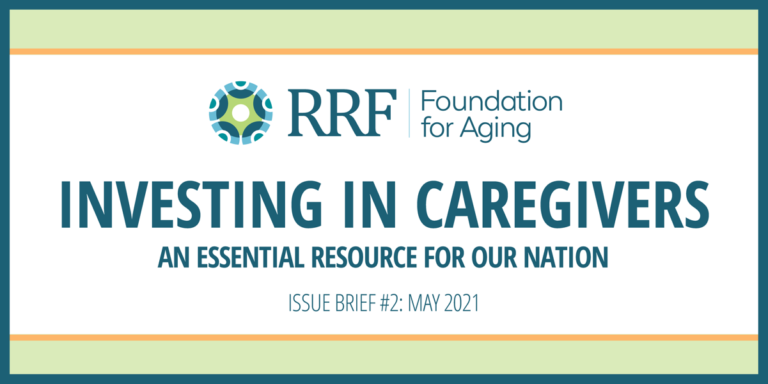
Caregiving
Ensuring that all care partners are informed, well-trained, and supported while providing care to older adults
In this Priority Area, we are specifically interested in projects that intentionally and directly focus on the caregiver; prioritizing outcomes most relevant to the caregiver themselves.
Caregivers can be family members, close friends, “chosen family,” or paid professionals.[1] Despite the emotional and physical demands of caregiving, these individuals display remarkable resilience and dedication. They often juggle multiple responsibilities, including managing healthcare tasks, providing emotional support, and assisting with daily activities. Their efforts, while sometimes leading to personal health and financial challenges, are a testament to the strength and compassion inherent in caregiving relationships.[2] [3]
Family and friend caregivers in the U.S. are vital, contributing significantly to the well-being of those they care for. Currently, more than 41 million people in the United States provide 38 billion hours of unpaid care to adults aged 50 and older, with an estimated economic value of $600 billion per year.[4] These caregivers, often motivated by personal values, love and commitment, ensure their loved ones can live independently and with dignity.[5]
While most people needing assistance at home receive only informal care from family and friends, if they receive any help at all, informal care is not always available or sufficient, leaving those in need to rely on the labor of direct care workers.
RRF Foundation for Aging has historically focused on informal (a.k.a. unpaid) caregivers, however, the increasing homecare workforce shortage has resulted in unmet care needs and premature institutionalization, which we cannot ignore. This shortage is driven by low wages, lack of benefits, limited career advancement opportunities, and challenging working conditions.[6]
In response to the caregiving crises we are witnessing, RRF is interested in multidisciplinary collaborations between researchers, practitioners, policymakers, and caregivers themselves to co-create solutions that transform the caregiving landscape.
We prioritize efforts that address the unique caregiving experiences of underrepresented and marginalized communities in order to foster equity, inclusivity, and justice in caregiving.
Examples of possible funding opportunities may include (but are not limited to):
- Advocacy projects that focus on public education, awareness, advocacy training, and coalition support at the local, state, and federal levels.
- For example, building on our grants to the National Academy for State Health Policy and Grantmakers in Aging, we want to see continued collaborative efforts to advance a Local, State, and National strategy for family caregivers, in solidarity with caregivers at all life stages.[7] We are also interested in applying existing research and knowledge to guide the development of policies and programs addressing caregiver needs, including access to respite care, financial support, legal protections, and flexible work arrangements.
- Direct service projects in Illinois that focus on diversity, equity and inclusion (DEI) service expansions and new services.
- For example, we are interested in funding continued efforts to provide historically marginalized caregivers with the services they need in order to achieve and maintain a positive quality of life while providing care.
- Research projects that focus on skill building/stress management for caregivers and that fill gaps in existing programming and focus on DEI.
- We want to see research that can help to implement and promote innovative and unique strategies to enhance well-being, and promote self-care, resilience, and empowerment among caregivers. We are also interested in research that explores the potential of emerging technologies, such as artificial intelligence, machine learning and robotics to revolutionize caregiving, and research that incorporates a user-centered design to build and evaluate innovative tools, assistive devices, and digital platforms that augment the caregiving experience, improve efficiency, and enhance the quality of care provided.
- Training and Education grants that focus on training providers, journalists, and entrepreneurs on topics relating to caregiving, specifically around DEI.
NOTE: Given the plethora of existing interventions to support caregivers of persons with Alzheimer’s and Related Dementias (see Best Programs Caregiving at https://bpc.caregiver.org/#home), the Foundation generally does not support proposals aimed at designing or testing new caregiving interventions for caregivers of persons with dementia. Exceptions may be made for caregiving interventions that are demonstrably unique relative to what already exists and/or interventions that intentionally address historically marginalized populations (including older adults who are: people of color; LGBTQ; women; and/or immigrants and refugees).
Sources
[1] Birenbaum, S. (2024). Care is Fundamental: How Funders Can Accelerate Vital Progress on Caregiving, Grantmakers in Aging. https://www.giaging.org/resources/national-strategy-support-family-caregivers-action-guide-philanthropy
[2] National Family Caregivers Month (2024, June). National Council on Aging. Retrieved on June, 2024, from https://www.ncoa.org/page/national-family-caregivers-month
[3] 2022 National Strategy to Support Family Caregivers (2024, June). Administration for Community Living. Retrieved on June, 2024 from https://acl.gov/programs/support-caregivers/raise-family-caregiving-advisory-council
[4] Reinhard, S.C.. Caldera, S., Houser, A., and Choula R.B.. (2023) Valuing the Invaluable 2023 Update: Strengthening Supports for Family Caregivers. AARP Public Policy Institute. https://doi.org/10.26419/ppi.00082.006
[5] Zarzycki, M., Seddon, D., & Morrison, V. (2023). Informal caregiver motivations, values, challenges and gains: A photovoice and interpretative phenomenological analysis of interrelationships. Journal of health psychology, 28(6), 568–582. https://doi.org/10.1177/13591053221124647
[6] Kreider, A. R., & Werner, R. M. (2023). The home care workforce has not kept pace with growth in home and community-based services: Study examines the US home care workforce alongside the growth in home-and community-based services. Health Affairs, 42(5), 650-657.
[7] RRF awarded a grant to National Academy for State Health Policy to develop a state policy roadmap on caregiving that provides practical resources for states to identify and implement policies and practices that support family caregivers. RRF supported Grantmakers in Aging’s Changing the Care Conversation, a collaborative initiative empowering state-based caregiving coalitions to ensure equitable family caregiving policies are advanced at the state and national level.
Things to Know

Learn about general grant exclusions, search our FAQs, watch an instructional video on our application process, read evaluation guidelines and learn how to develop SMART objectives.



